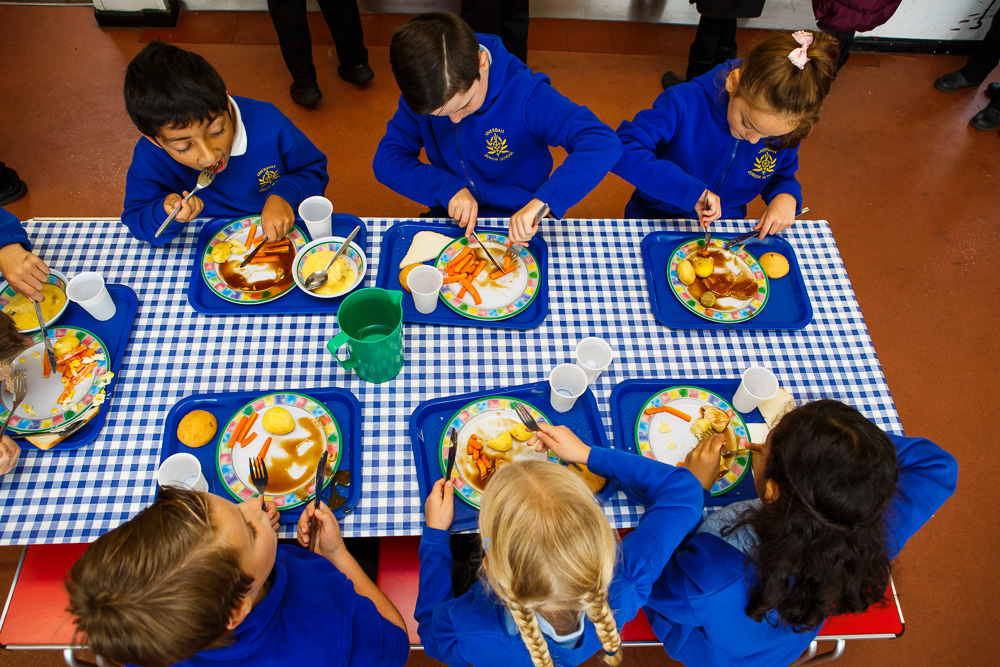News • Good Food Trade Campaign
School children could go short of food in no-deal Brexit say children’s health charities
The health of millions of UK children could be at risk if supplies of food to schools are not protected from a no-deal Brexit, say top chefs and food charities.

In an open letter to The Times, over 30 children’s health and wellbeing professionals, campaigners and unions, including top chef Hugh Fearnley-Whittingstall have called on the government to protect school meals in the event of no-deal Brexit.
Campaigners are concerned about the 3 million children across the UK that depend on their free school meal as one of their main sources of nutrition. With anticipated interruptions to the supply of fresh fruit and vegetables, and food prices set to rise by anything up to 10%, the letter calls for urgent assurance that extra funding will be available to ensure schools can continue to feed children well.
The open letter reads:
Dear Sir
We believe that the health of millions of UK children could be at risk if food supplies to schools are not protected from a no-deal Brexit.
With anticipated interruptions to the supply of fresh fruit and vegetables and food prices set to rise by anything up to 10%, we call on the government to protect the food of the 3 million children in the UK who depend on their free school meal as one of their main sources of nutrition.
The Department for Education (DfE) insists that schools will have what they need to meet school food standards, provide nutritious meals and that the UK has a ‘high level of food security’ which will continue ‘with or without a deal’.
However, in private the government predicts food shortages and consumer panic buying. The EU Exit day at the end of October comes at the end of the British growing season when the UK becomes more reliant on fresh fruit and veg from other European countries. Some British growers have also suffered significant crop losses this year due to the bad weather.
We are concerned about how schools who are already experiencing budget shortages will cope with limited fresh food supplies and price hikes. The public sector caterers will be hit harder as they will not have the same buying power as their private sector colleagues.
It will be the most vulnerable school pupils who will end up losing out. The Government needs to reassure schools urgently that extra funding will be reliably available to ensure schools can continue to feed children well.
Signed:
Kath Dalmeny, Chief Executive, Sustain: The Alliance for Better Food and Farming
Hugh Fearnley-Whittingstall, Leading chef, food writer, campaigner and founder of River Cottage
Dave Prentis, General Secretary; UNISON
Stephanie Wood, Chief Executive, School Food Matters
Shirley Cramer, CBE, Chief Executive, Royal Society for Public Health
Anne-Marie O’Leary, Editor-in-Chief, Netmums
Dr Mary Bousted, Joint General Secretary, National Education Union
Chris Keates, General Secretary (Acting), NASUWT The Teachers' Union
Jamie Agombar, Head of Sustainability, NUS
Andy Burman, Chief Executive, British Dietetic Association
Kieron Boyle, Chief Executive, Guy’s and St Thomas’ Charity
Michael Hales, National Chair - LACA
Dr Andy Kemp MBE, Bidfood
Mark Davies, Managing Director, ISS Food Services
Tim Lang, Professor of Food Policy, City University
Dr Helen Crawley, Director, First Steps Nutrition Trust
Rob Percival, Head of Policy (food & health), Soil Association
Fiona Twycross AM, Deputy Mayor for Fire and Resilience, Office of the Mayor of London
Keith Breasley, National Chair, ASSISTfm
Sabine Goodwin, Coordinator, Independent Food Aid Network
James Bielby, Chief Executive, Federation of Wholesale Distributors
Barbara Crowther, Co-ordinator, Children’s Food Campaign
Fran Bernhardt, Co-ordinator, Sugar Smart
Derek Estill, General Assembly Moderator, United Reformed Church
Bhawani Singh Shekhawat, CEO (UK and Europe) Akshaya Patra foundation
Marjon Willers, Director, Health Education Trust
James Toop, Chief Executive, Bite Back 2030
Anna Taylor OBE, Executive Director, The Food Foundation.
Victoria Williams, Director, Food Matters
Tom Lambeth, CEO, Food for Thought
Dan Crossley, Executive Director, Food Ethics Council
Revd Dr Barbara Glasson, President of the Methodist Conference
Laurence Guinness, Chief Executive, Childhood Trust
Paul Evans, Operations Director - School Health UK and Vice Chairman, The British Obesity Society
Jason O'Rourke, Headteacher, Washingborough Academy
Louise T Davies, Founder - Food Teachers Centre
Tom Skinner, Director Greater Manchester Poverty Action
Bee Wilson, Food writer and Chair of TastEd
Helena Houghton, Adopt a School Programme Director, Royal Academy of Culinary Arts
Caroline Morgan, Chief Executive, Local Food Links Ltd
Philip Mansbridge, Executive Director, ProVeg UK
Alysa Remtulla, Head of Policy and Campaigns , Magic Breakfast
Brad Pearce, Managing Director – CATERed Ltd
Michael Nelson PhD RNutr (Public Health), Director, Public Health Nutrition Research Ltd, King’s College London
Rachel Hall, CEO City Catering Southampton
Pat Fellowes, Consultant, School Meals
Kath Dalmeny, chief executive of the food and farming alliance Sustain, which runs the Children’s Food Campaign, said:
"The Government can’t keep on repeating its ‘keep calm and carry on’ message to the public. Leaked Cabinet documents say they are predicting possible fresh fruit and vegetable shortages and price increases. It’s not clear how school cooks and caterers will be able to keep children’s plates full and nutritional standards high if there is little fresh fruit and veg available, and if food costs more. It would be the most vulnerable school pupils who would end up losing out. The Government needs urgently to reassure schools that extra funding will be reliably available to ensure schools can continue to feed children well.”
In addition to school children reliant on free school meals, the Sustain alliance estimates that over 10.5 million people rely on public sector institutions such as schools, hospitals (142,000 bed spaces), prisons (83,000) and care homes (430,000 people) for some or all of their food each year. But these same institutions have little spare money or storage space to stockpile food (some may be stockpiled on their behalf by commercial providers, but this information is not available).
Almost 3 million children across the UK receive a free school meal because they are from families on low incomes, who receive tax credits or are on benefits.
School food standards have been in place since 2015, following a comprehensive review of the quality and nutritional value of school food, carried out by LEON restaurant chain founders Henry Dimbleby and John Vincent. Henry Dimbleby is now a non-executive director of Defra, appointed to head up the National Food Strategy process.
Published Sunday 25 August 2019
Good Food Trade Campaign: Campaigning for good trade that benefits people and the planet at home and overseas.





